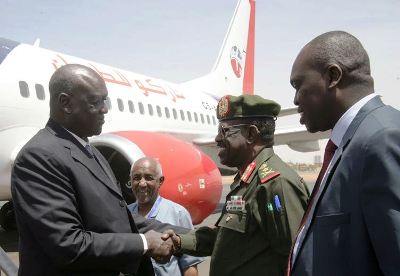South Sudan defence minister in Khartoum over security issues
March 18, 2014 (JUBA) – South Sudanese defence minister, Kuol Manyang Juuk left for the Sudanese capital, Khartoum on Tuesday with what he described as a “special message” from President Salva Kiir to his Sudanese counterpart, Omer Al-Bashir.

“I am carrying with me special message from our president Salva Kiir Mayardit to his brother, president Omer Al-Bashir. My visit will focus on two issues: the border demarcation between the two countries and the presence of the rebels along the border areas,” said Juuk.
“This is very important because rebels loyal to Riek Machar and Taban Deng Gai expect support from some neighbouring countries. We want to tell the Sudanese authorities not to help them,” he added.
The South Sudanese defence minister, however, downplayed possibilities of Sudan supporting the rebels, asserting that stability serves the interests of both countries.
Juuk was welcomed at Khartoum Airport by the Sudanese state minister for defence, Yahya Mohamed Khair, who told reporters that the visit comes in the framework of continued consultations towards the development of bilateral relations, hoping that South Sudan regains peace and stability.
The visit comes in the wake of continuous reports in the Sudanese press alleging the participation of the Justice and Equality Movement (JEM) rebels in the fight against South Sudan rebels.
Last Tuesday, different Sudanese dailies reported that JEM recruits Sudanese from North and South Kordofan to fight in its ranks against the SPLM-In-Opposition in coordination with the South Sudanese authorities adding that the leader of the Sudanese rebel group, Gibril Ibrahim, closely works with military officials in the new nation.
Both the Juba government and the Darfur rebel group denied such accusations, which were also circulated by the South Sudanese rebels.
Violence erupted in the South Sudanese capital, Juba in mid-December last year killing at least 10,000 and displacing nearly a million. President Kiir accused his former deputy Machar of instigating the violence, which the latter blatantly dismissed.
Before the start of the South Sudanese conflict, Juba and Khartoum agreed to normalise relations and to implement a cooperation agreement signed in 24 September 2012. The two countries have, however, failed to deploy a joint force to monitor the border because of their difference over the baseline for the demilitarized security zone called zero line.
President Bashir has maintained support for his South Sudanese counterpart since his visit to Juba on 6 January. However, the two countries denied they agreed on signing a security agreement to deploy a joint forces to protect South Sudan’s oil fields.
(ST)
